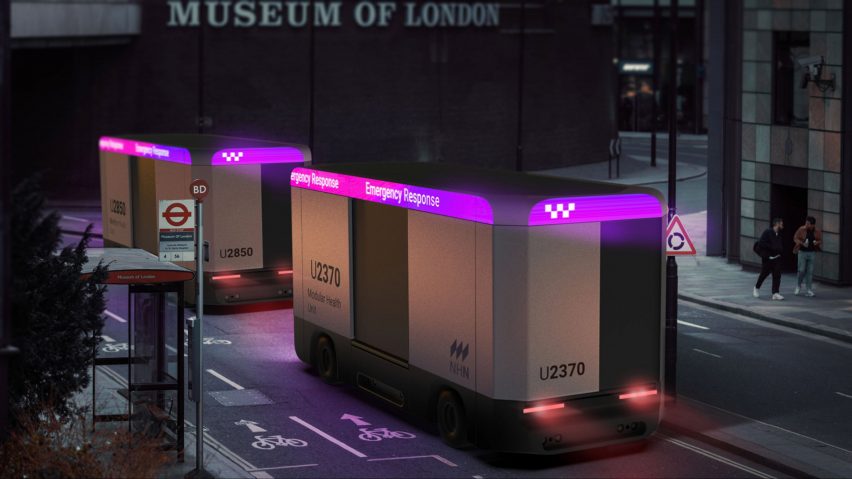Mike George's proposal for an autonomous fleet of modular emergency vehicles that can be arranged to form an on-the-go hospital has been awarded third place in Dezeen's Future Mobility Competition powered by Arrival.
Called National Health Network Modular Hospital System, George's proposal features a network of modular autonomous vehicles that can be combined into purpose-built clusters to enable hospitals to grow, adapt and respond to emergencies as effectively and flexibly as required.
Each module has a chassis and mobile platform, which can be customised with various interior components to respond to different medical situations. Each interior is designed to foster patient accessibility and comfort, as well as safety.
The modular nature of the vehicles enables large clusters to be formed, which can quickly and easily be scaled or shrunk dependant on local demand.
The vehicles feature built-in solar panels on the roof with the option of wind-powered generators to make each module self-sufficient.
George's entry presents an "imaginative and relevant" vision for larger societal needs
The concept was designed to reduce pressure on health services such as the NHS, which struggles with congestion, long wait times and lack of hospital beds in cities, while providing faster access and better connectivity in rural or remote areas.
The vehicles are designed to prioritise emergency aid and disaster relief when conventional hospital facilities or resources are scarce.
When not required for emergency use, the vehicles can also provide core hospital services such as general patient, maternity and paediatric wards.
The Future Mobility Competition judges, which included Kunlé Adeyemi, Elizabeth Diller, Yves Béhar along with Jeremy Offer and Martina Wierzbicki from Arrival and Marcus Fairs and Cajsa Carlson from Dezeen, selected the entry as third place in the competition, which called for mobility solutions that reimagine the future of transportation.
"This concept isn't about individual vehicles, but more about larger societal needs," said the judges. "It thinks big and in a systematic fashion."
The judges described the concept as "beautifully designed and executed" and "very relevant considering the pandemic we just came out of".
Read more about the proposal below:
National Health Network Modular Hospital System
Mike George
Melbourne, Australia
Third place
"The NHS is currently facing the challenge of accommodating exponentially growing demand for its service.
"A huge problem for both ambulance and hospital staff is the smooth planning and deployment of emergency vehicles due to regular delays and hold ups when handing patients over to acute hospitals that are often running at capacity with no beds available.
"Other challenges for the current 'one-size-fits-all' model's efficiency are geographic variables such as: a catchment area's physical size, its population count, average age, how rural or urban an area is and the spread or density of people living there.
"More populated urban areas often face the issue of extremely high demand, while rural areas often lack certain specialist services and face long journeys to the nearest A&E department.
"One of the main insights from OMA studio's research on the future of healthcare is that hospitals are lasting less and less time before they become obsolete, which means that a drastic rethink is necessary to allow for hospitals to become more agile and resilient to change.
"This concept takes inspiration from both the Arrival Elements system and their 'micro factory' approach to production.
"Modules would consist of the core elements that make up a functional hospital, with a focus on emergency aid. These modules include: general patient wards, surgery theatres, radiology, maternity wards, paediatrics, pathology, reception and waiting areas, GP consultation rooms, nurses stations and utility rooms.
"Each unit, including peripheral components such as ambulances and patient life support systems, would also be able to connect to and charge from the main grid of the system."
Future Mobility Competition
The Future Mobility Competition is a global design contest that seeks to support emerging talent, bringing radical solutions to solve mobility challenges in cities and, in turn, create true sustainability and empower local communities.
Launched in partnership with electric vehicle company Arrival, the contest asked entrants to identify problems with mobility in their city, or a city they are familiar with, and propose solutions that will improve how people move around their environment.
The contest received over 170 entries from more than 45 different countries around the world.
The panel selected 10 proposals as finalists to be published on Dezeen. We are unveiling one finalist a day from 27 June, culminating in the winner being announced on 8 July.
The winner will win the top prize of $25,000, while the runner-up will receive $15,000 and the third-placed entrant will receive $10,000. Each of the seven remaining finalists will receive prize money of $5,000.
Find out more about the Future Mobility Competition ›
See all the finalists revealed so far ›
Partnership content
The Future Mobility Competition powered by Arrival is a partnership between Dezeen and Arrival. Find out more about Dezeen partnership content here.

